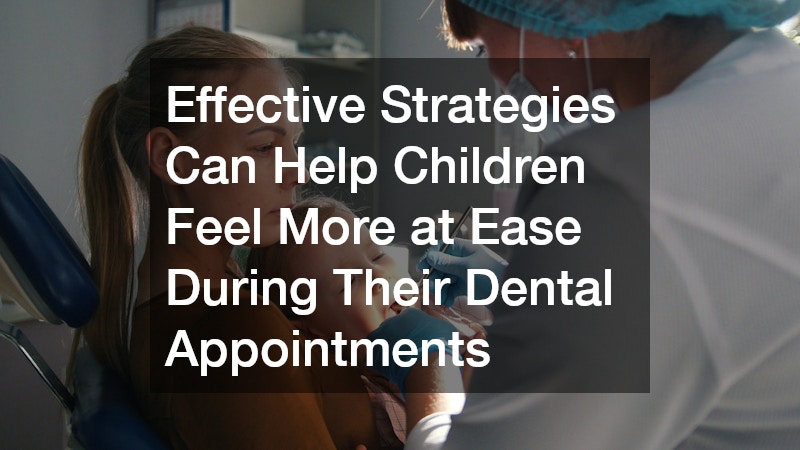How to Help Children Be Comfortable at the Dentist
The importance of dental visits for children cannot be overstated. Regular dental check-ups are essential for maintaining oral health, preventing cavities, and establishing lifelong hygiene habits. However, many children experience anxiety and fear when visiting the dentist, hindering their ability to receive necessary care. This article explores effective strategies to help children feel more at ease during their dental appointments, ensuring they remain open to a lifetime of healthy dental habits.
Why are Children Afraid of the Dentist?
Children’s fear of visiting the dentist often stems from a lack of understanding or past negative experiences. The unfamiliar environment of a dental office, along with sounds, smells, and the sight of dental equipment, can be overwhelming for a young child.
This fear is exacerbated if a child has previously experienced pain during dental procedures. Understanding these psychological factors is the first step in addressing and alleviating dental anxiety in children.
In addition to sensory overload, children may fear the dentist due to the anticipation of pain or discomfort. Many children associate dental visits with injections, drilling, and strange instruments in their mouths. This anticipation often arises from horror stories shared by peers or dramatizations in media, making dental visits seem far scarier than they are. Educating children about what to expect in a factual and reassuring manner can dispel some of these myths and reduce fear.
Another significant contributor to dental anxiety in children is the perception of a lack of control. In a dentist’s chair, children might feel powerless, especially when facing a masked stranger performing tasks they might not fully understand. It is crucial that both parents and dental professionals work to offer explanations and reassurances to empower children. By involving children in the process and encouraging them to express their fears, we can significantly reduce their anxiety and build their confidence.
How Can Parents Prepare Their Children for Dental Visits?
Parents play a vital role in preparing their children for dental visits. One effective method is role-playing dental visits at home. By simulating a dental appointment, parents can familiarize their children with the process, help them visualize what will happen, and reduce the fear of the unknown. This type of play allows children to ask questions and express their concerns in a safe and controlled environment, making them feel more comfortable when the real visit occurs.
Another strategy for parents is to use positive language when discussing dental visits. Avoid using words like “pain,” “shots,” or “drills,” and instead focus on the benefits of dental care, like having a shiny smile or healthy teeth. Explain that dentists are there to help keep teeth strong and beautiful. Additionally, parents should encourage their children to ask the dentist questions and communicate any fears they might have, fostering a sense of involvement and trust.
Preparation for a dental visit should also include clear explanations of what will happen during the appointment. Parents can use age-appropriate explanations to inform their children about dental procedures. Reading children’s books about dental visits or watching child-friendly videos can also help demystify the dentist’s office. By providing children with concrete details in advance, parents can help reduce the fear of the unknown and build their children’s confidence on the day of the visit.
What Role Do Dentists Play in Making Children Comfortable?
Dentists, especially pediatric specialists, have a crucial role in creating a child-friendly environment. From the first interaction, a dentist can establish a welcoming atmosphere by using a gentle, friendly demeanor. Pediatric dentists are typically specially trained to manage pediatric dental anxiety, employing techniques such as “tell-show-do” to explain procedures in a child-friendly manner. By connecting with children on their level, dentists can transform what could be a daunting experience into a positive one.
Furthermore, the office environment itself can make a significant difference in a child’s comfort level. A waiting area with bright colors, toys, and books can help children feel more at ease. Examination rooms equipped with distractions like kid-friendly shows or engaging art can shift the focus from fear to fun. By intentionally designing a space that appeals to a child’s senses, dentists can make their practices more inviting to young patients.
In addition to the environment, dentists can employ techniques to empower children during their appointments. Allowing children to make choices, such as picking the flavor of their fluoride treatment or the color of their toothbrush, gives them a sense of control. By discussing procedures and properly managing expectations, dentists can gradually build a child’s trust. Additionally, using praise and rewards can reinforce positive behavior and reduce fear, ensuring that children leave the office with a sense of accomplishment.
By understanding children’s apprehensions and taking proactive steps, both parents and dentists can help cultivate a positive experience at the dentist’s office, ensuring children maintain good dental habits throughout their lives. With a combination of preparation, clear communication, and a welcoming environment, dental visits can become not only manageable but enjoyable for children. Overcoming dental anxiety is a collaborative effort that benefits the child’s present experiences and future health.







